10 AI Customer Support Software to Streamline Responses in 2025



Thunai learns, listens, communicates, and automates workflows for your revenue generation team - Sales, Marketing and Customer Success.
Want a support system that retains customers and assists your team?
Well, we'll dive into the AI customer support software solutions to personalize interactions and grow your service activities for consistent customer retention.
What is AI Customer Support Software?
AI customer support software is a category of tools that use artificial intelligence to automate customer interactions, give immediate self-help choices, assist human agents, and analyze support data to improve the overall customer journey.
These platforms often combine capabilities like AI-assisted chatbots, virtual agents, knowledge collection assistants, sentiment analysis, and predictive analytics with traditional helpdesk functions like ticketing, shared inboxes, and live chat.
In general, AI customer support software is designed to handle a high volume of inquiries, have round-the-clock support, and free up human agents to handle more complex issues
Who Should Use AI Customer Support Software?
AI customer support software is built for companies looking to improve effectiveness, shorten reply times, and give adaptable assistance across multiple channels.
The reality is that 80% of individuals forgive a bad experience if the customer support is “very good”. This is right for anyone or tasks that can include:
- Customer Support Teams: Anyone seeking to automate repetitive tasks, increase agent output, and permit quicker solutions can use AI customer support tools to ramp up productivity.
- Companies with High Inquiry Volume: Companies receiving a large number of common or Tier-1 support requests that can be handled by AI customer support tools.
- Businesses Prioritizing Round-the-Clock Support: AI customer support tools suit businesses that need to give immediate help outside of regular business hours.
- Teams Seeking Data-Driven Insights: Support leaders who want to analyze interaction data, understand customer sentiment, and identify areas for improvement.
- Companies Focused on Self-Service: AI customer support tools help businesses aiming to assist customers in finding answers independently through extensive knowledge collections and AI assistance.
How AI Can Improve Your Customer Support Efficiency
Customer expectations are higher than ever; they demand fast, personalized, and accessible support.
AI customer support software helps teams meet these demands by letting them work smarter, not harder, across a longer, more strategic service cycle. But here are the main reasons you should work with AI customer support tools:
- Quicker Resolutions: AI agents can instantly resolve common queries, visibly shortening solution times.
- Increased Agent Output: By automating routine tasks, AI customer support software frees up human agents to handle more complex and nuanced customer issues.
- Adaptable Assistance: AI allows businesses to handle a growing volume of support requests without proportionally increasing staff.
- Improved Customer Satisfaction: immediate, round-the-clock help and personalized interactions lead to happier customers.
- Data-Driven Optimization: AI analytics through customer support software yield a useful understanding of support performance and customer needs, permitting ongoing betterment.
Our Criteria for Selecting the Top AI Customer Support Tools
- AI Capabilities: The best ai customer support tools aren't just adding chatbots as an afterthought—they use AI across multiple functions, including automation, agent assistance, knowledge management, and analytics. We picked platforms with strong and working AI capabilities.
- Connectivity: If it doesn't link smoothly with your existing CRM, ecommerce platform, or other business tools, it creates data silos. We looked for tools that have wide-ranging connection choices to give a single perspective of the customer.
- Ease of Use: Support teams need tools that are intuitive and easy to navigate, shortening training duration and allowing agents to focus on helping customers.
- Adaptability: From a small startup to a large enterprise, your ai customer support solutions should grow with you without breaking your process or your budget. These tools are built to handle increasing data volumes and user demands.
- User Reviews and Reputation: We synthesized feedback from various sources to understand real-world strengths and weaknesses regarding usability, performance, and support.
Top AI Customer Support Software Comparison
Evaluating platforms based on best use case, pricing structure, and core features.
| Vendor | Best For | Pricing | Key Features |
|---|---|---|---|
| Thunai | AI Business Intelligence and Automation | Free Tier; Paid from $9/mo | AI Agents, Knowledge Hub, Workflow Automation, Personalized Content Creation |
| Zendesk | Comprehensive CX and Help Desk | Paid from $55/agent/mo | Omnichannel Ticketing, AI & Automation, Self-Service Options |
| HubSpot Service Hub | Integrated CRM and Customer Service | Free Tools; Paid from $15- $20/seat/mo | Omnichannel Help Desk, AI Capabilities (Breeze), Self-Service Tools |
| Intercom | AI-First Conversational CX Platform | Paid from $29/seat/mo | Fin AI Agent, Omnichannel Inbox, Help Center, Workflow Automation |
| Jira Service Management Virtual Agent | AI Feature within ITSM/ESM | Requires JSM Premium/Enterprise Plan | Automated Request Handling, Intent-Based Flows, AI Answers |
10 Best AI Customer Support Software Solutions in 2025
1. Thunai

Developed by Entrans, Thunai is a customer support AI agent made to function as a central "AI brain" for businesses
This means your full customer support team has cohesive information and access to deep technical insight sourced from your knowledge base that can pop up as smart suggestions during calls.
Thunai also works with a wide range of tools and can be paired with your Google Workspace. Although relatively new to the market, Thunai allows for call scoring, making it a useful tool for businesses looking to scale customer support.
Thunai is one of the best AI customer support software for creating an integrated AI layer across multiple business functions, dealing heavily with continuous learning and personalization.
Key Features of Thunai
- Thunai Brain (Centralized Knowledge Hub): Can take and process information from diverse sources (documents, videos, etc.) to build a company-specific knowledge base. Improve customer support by granting your team technical expertise at their fingertips.
- Interaction Capture and Call Scoring: Integrates with meeting platforms (Zoom, Teams, Meet) to capture, transcribe, and analyze conversations for sentiment and action items, and score how well customer interactions went.
- AI Communication Agents: Thunai allows you to use AI-powered chatbots and voice agents to handle queries and workflows. This can be through a website chat widget that grants real-time answers or even an AI voice agent that responds to verbal enquiries over support calls.
- Workflow Automation: An AI customer support tool like Thunai connects with applications like Gmail and CRM systems to automate tasks such as drafting emails, syncing calendars, and even data entry.
- Personalized Email Creation: Can generate emails for customers, including emails, and give agents call summaries from previous calls and interactions.
- Multilingual Support: Capable of understanding and responding in 50+ regional languages.
2. Zendesk
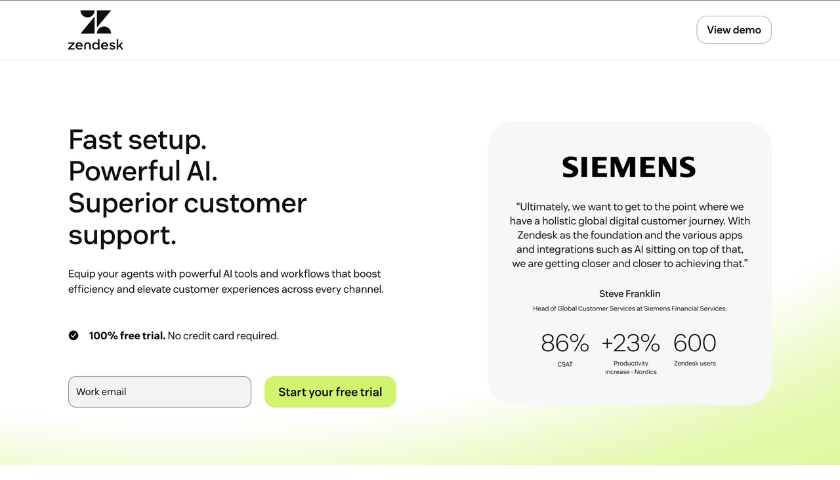
Zendesk positions itself as a complete, AI-assisted customer support software suitable for businesses ranging from small operations to large enterprises.
Founded in 2007, Zendesk has a significant history of evolution, including going public and later being acquired by private equity. This signifies a mature platform with substantial market presence.
Key Features of Zendesk
- Omnichannel Communication: Collects customer interactions from diverse channels (email, chat, voice, social media) into a unified "Agent Workspace".
- Ticketing System: Converts customer requests into trackable tickets, allowing for categorization, prioritization, and assignment.
- AI and Automation (Zendesk AI / Freddy AI): Includes AI agents for resolving conversations, AI tools for customer support like macros and triggers and AI assistance for summaries. Zendesk also has reply suggestions and an Answer Bot for deflecting common questions.
- Self-Service Options: Has AI tools for customer support to create a Help Center/Knowledge Base, Community Forums, and a Customer Portal.
3. Hubspot Service Hub

HubSpot Service Hub is the customer service component of the broader HubSpot Customer Platform, an integrated suite that also encompasses Marketing Hub and Sales Hub.
This AI customer support software’s core value proposition lies in its tight integration with the HubSpot Smart CRM, providing a unified view of the customer.
Service Hub has tools for omnichannel help desk support, ticketing, self-service, automation, customer feedback, and reporting, enhanced by HubSpot's AI capabilities, branded as "Breeze".
Key Features of HubSpot Service Hub
- Omnichannel Help Desk and Ticketing: Features a shared inbox and ticketing system to centralize customer communications.
- AI Capabilities (Breeze): Comes with an AI Customer Agent for automating ticket resolution, an AI Knowledge Base Agent, and other AI tools for customer support for reporting and content creation.
- Automation: This is one of the better AI customer support tools for automating customer service processes like ticket routing and escalations.
- Deep CRM Integration: Natively built on the HubSpot Smart CRM, this software gives agents a complete view of customer history.
4. Intercom

Intercom positions itself as an AI-first customer service platform built around facilitating personalized, messenger-based customer interactions throughout the entire customer journey.
Founded in 2011, its AI customer support tools provide versatility with functions, this includes a sophisticated AI chatbot (Fin AI Agent), an omnichannel shared inbox, help desk, and ticketing capabilities, a knowledge base, proactive outbound messaging features, and workflow automation.
Intercom's history includes securing significant venture capital funding and experiencing rapid growth.
Key Features of Intercom
- Omnichannel Inbox: A unified workspace where support teams can manage conversations from all connected channels.
- Help Center: A knowledge base solution allowing businesses to create and publish articles for customer self-service.
- Copilot: An AI assistant integrated into the agent inbox to provide real-time assistance.
- Automation and Workflows: A no-code visual workflow builder allows teams to automate tasks.
5. Jira Service Management Virtual Service Agent
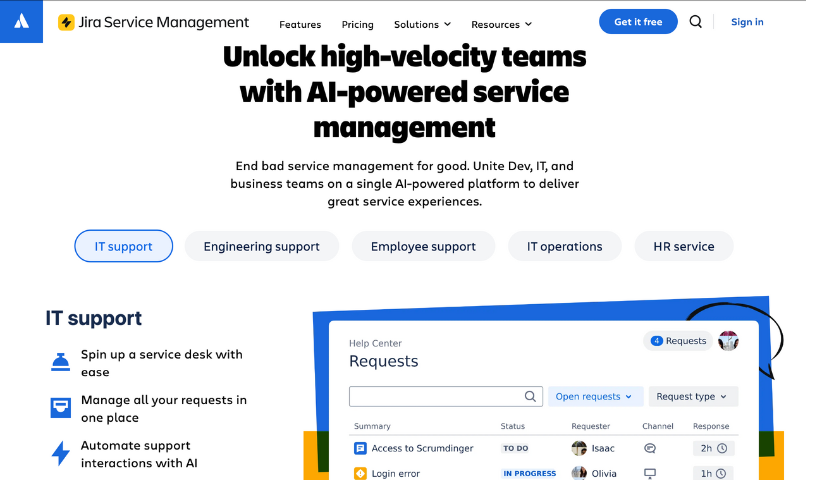
The Jira Service Management (JSM) Virtual Agent is not a separate software item but rather a connected, AI-driven capability available within the Premium and Enterprise tiers of Atlassian's Jira Service Management Cloud platform.
Jira Service Management Virtual Service Agent’s primary function is to automate Tier-1 support interactions, deflect common requests using a knowledge collection, and escalate issues to human agents when necessary.
This is one of the best AI customer support tools that operates primarily through chat interfaces.
Key Features of JSM Virtual Agent
- Automated Request Handling: Engages with users via chat to understand their requests and grant help for common issues.
- AI Answers (Powered by Atlassian Intelligence): Uses generative AI to search the linked Confluence knowledge collection and formulate answers.
- Information Gathering and Ticket Creation: Can collect necessary details from the user and automatically create a JSM ticket if unable to resolve the issue.
- Performance Analytics: Tracks metrics like resolution rate and matched rate.
6. HelpCrunch

HelpCrunch is presented as an all-in-one customer communication platform designed to serve the needs of support, marketing, and sales teams, particularly within SMBs and e-commerce businesses.
HelpCrunch combines live chat, a shared team inbox, a knowledge collection builder, email marketing automation, and website pop-ups.
This is one of the best AI customer support tools on the market right now for ease of use, affordability, and giving outstanding customer assistance.
Key Features of HelpCrunch
- Live Chat: A customizable chat widget for real-time conversations.
- Shared Inbox / Help Desk: Collects customer conversations from ultiple channels into a single team inbox.
- AI Features: Chatbot capabilities and "Helpcrunch AI" branding are associated with the shared inbox and knowledge collection, with an AI editor to assist agents. Rule-based bots are available.
- Mobile Support: Has mobile apps for agents and SDKs for connecting to native mobile applications.
7. FreshDesk

Freshdesk is a widely used cloud-based customer service software developed by Freshworks. It is made to aid businesses of all sizes in delivering effective customer assistance by unifying interactions from multiple channels into a single help desk ticketing system.
Key features with Freshdesk include omnichannel support, ticketing management, automation, self-service options, reporting, and AI-assisted features under the "Freddy AI" brand.
Key Features of Freshdesk
- Omnichannel Ticketing System: Centralizes customer requests from email, phone, chat, and social media into a unified ticket inbox.
- Ticket Management: Features include ticket prioritization, assignment, agent collision detection, and SLA management.
- Automation: This is one of the AI customer support tools that comes with workflow automation rules and automated ticket routing.
- Collaboration Tools: Features like shared inbox access and internal notes facilitate teamwork.
8. HelpScout
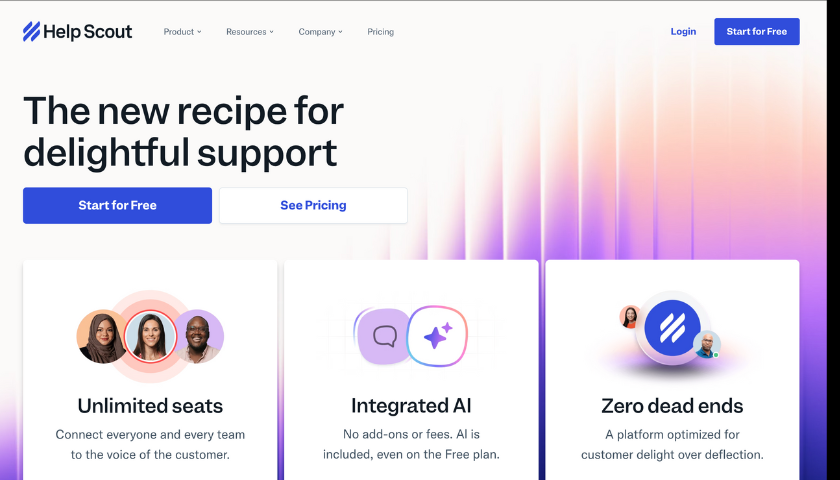
Help Scout is a customer communication platform primarily focused on providing help desk software, shared inbox management, knowledge base tools (Docs), and live chat (Beacon).
Founded in 2011, this has grown to be one of the best AI customer support software for growing businesses and particularly SMBs. HelpScout emphasizes ease of use and a human-centric approach to support.
Key Features of Help Scout
- Shared Inbox: Centralizes customer emails and other communication channels into a collaborative workspace.
- Beacon (Live Chat & Help Widget): An embeddable widget providing website visitors with access to Docs articles, live chat, or a contact form. Includes AI Answers.
- Reporting & Analytics: Provides reports on conversation volume, response times, and customer happiness.
- Automation (Workflows): Allows automating tasks like tagging conversations and assigning them to teams/agents.
9. Gorgias

Gorgias is a customer service helpdesk platform specifically designed and optimized for e-commerce businesses, particularly those using platforms like Shopify, Magento, and BigCommerce.
Founded in 2015, this is one of the AI customer support tools that aims to centralize customer interactions from various channels into a unified view, integrated tightly with e-commerce back-office data.
Gorgias's history is characterized by a successful pivot based on identifying a specific market need within the rapidly growing e-commerce sector.
This AI customer support software aims at integrating with e-commerce platforms, which has been key to the platform's growth in popularity and its increasing user base.
Key Features of Gorgias
- Unified Helpdesk: Centralizes customer conversations from email, live chat, phone, social media, and SMS into a single inbox.
- Deep Ecommerce Integration: Natively integrates with Shopify, Magento, and BigCommerce, displaying customer data directly within the ticket view.
- AI and Automation: Includes an AI Agent for resolving common inquiries, Automated Workflows (Rules) for automating tasks, Macros for templated responses, and Intent & Sentiment Detection.
- Voice and SMS: This AI customer support tool comes integrated phone and SMS support capabilities.
10. Zoho Desk
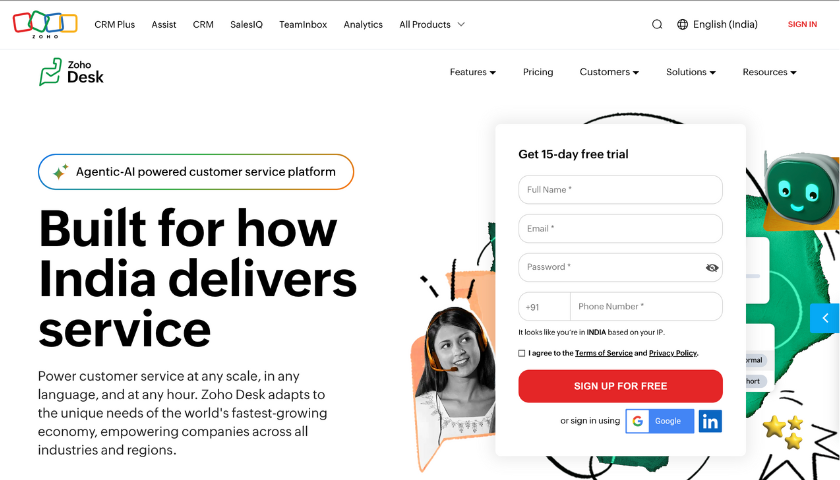
Zoho Desk is a customer service software platform that is part of the broader Zoho Suite of business applications.
This AI customer support software is designed to help businesses manage customer support interactions across multiple channels, presenting capabilities like ticketing, automation, self-help choices, and AI capabilities powered by Zia, Zoho's AI assistant.
Zoho Desk benefits from being part of the extensive Zoho ecosystem, which includes a wide range of connected business applications.
Key Features of Zoho Desk
- Omnichannel Ticketing: Manages customer requests from various channels within a unified interface.
- AI (Zia): Uses Zia, Zoho's AI assistant, for features like sentiment analysis, anomaly detection, and suggesting responses.
- Self-Service: Gives AI customer support tools to create a knowledge collection and a customer portal.
- Integrations: Connects with other Zoho applications and presents connections with third-party services.
How to Choose the Perfect AI Customer Support Software for Your Business
When selecting AI customer support software, consider these key factors to make sure it meets your company's specific needs:
- Scalability: The software should be able to scale with your growing support team and business needs, handling increasing data volumes and user demands.
- AI Capabilities: Look into the software's automation capabilities and AI-driven features, such as AI agents, knowledge base assistance, and sentiment analysis, to improve support processes and efficiency.
- Integration: Make sure the software can work with your existing CRM, ecommerce platform, and other business-critical ai customer support tools to avoid data silos and improve workflows.
- Analytics and Reporting: Look for reliable analytics and reporting features that provide real-time insights into support performance and key metrics, helping data-driven decision-making.
5+ Expert Tips for Implementing AI in Customer Support
- Organize Your Knowledge Base: AI relies heavily on your existing information. Make certain your help articles and FAQs are up-to-date, accurate, and easy for the AI to access and understand.
- Train Your Team to Collaborate with AI: Position the AI as an assistant to your human agents, not a replacement. Show your team how the AI customer support software helps them focus on more demanding customer situations.
- Prioritize Good System Connectivity: Choose AI customer support tools that work smoothly with your existing helpdesk, CRM, or sales platforms. This avoids information silos and keeps operations efficient.
- Set Clear Handoff Points to Humans: Establish definite rules for when the AI should transfer a complex or sensitive conversation to a human agent. This maintains a good customer experience.
- Monitor Performance and Gather Feedback: Regularly review how the AI customer support software is performing using metrics and customer input. Use these insights to refine its responses and processes over time.
Why Use Thunai for AI Customer Support?
Thunai AI is an AI customer support software that automates key workflows so that your support team can focus on resolving complex issues, not repetitive tasks.
While on support calls or chats, Thunai can provide real-time insights and suggestions. Features like sentiment analysis give your managers and team better, more informed insight into customer interactions. With AI call scoring and voice agents that sound natural, you can add customer support to your business without breaking the bank.
Want predictable support growth and to learn how to master your service pipeline? Try Thunai for free and improve your AI customer support process.
AI Customer Support Software FAQs
What is the best AI software for customer service?
The best AI software for customer service is the one that helps your team move faster, resolve smarter, and stay aligned. Based on our analysis, Thunai stands out for its comprehensive AI capabilities across knowledge management, automation, and agent assistance. However, ai customer support tools like Zendesk, HubSpot Service Hub, and Intercom also top the list for their robust features and market presence.
How does AI help in customer support?
AI helps in customer support in numerous ways, including automating responses to frequently asked questions through chatbots and virtual agents, providing instant self-service options via knowledge bases, assisting human agents with tasks like summarizing conversations and suggesting replies, analyzing customer sentiment, and automating workflows like ticket routing and categorization.
How is AI used in customer support?
AI tools like chatbots instantly answer common questions to give customers fast solutions 24/7. They also categorize and route complex tickets to the right human agents automatically. Behind the scenes, AI analyzes customer feedback to help companies improve their products and services
What is AI CRM software?
AI CRM software combines traditional customer relationship management with artificial intelligence to automate data entry and administrative tasks. It predicts customer behavior, such as who is likely to buy or cancel, to help teams prioritize their efforts.
How is AI used in customer success?
AI analyzes usage data to predict which customers are at risk of leaving so managers can intervene early. It identifies upsell opportunities by spotting customers who are ready for more advanced features.
Does Amazon use AI for customer support?
Yes, Amazon uses a generative AI assistant named Rufus to answer shopper questions and resolve issues like order tracking. Aside from this, they also internally, have their agents use AI tools to quickly find answers and policies during live support calls.
How is AI used in call centers?
AI listens to calls in real-time to transcribe conversations and assess customer emotion. In doing this, it suggests helpful articles and suggested answers on the agent's screen while they talk. After the call, it automatically summarizes the discussion and updates the customer's record

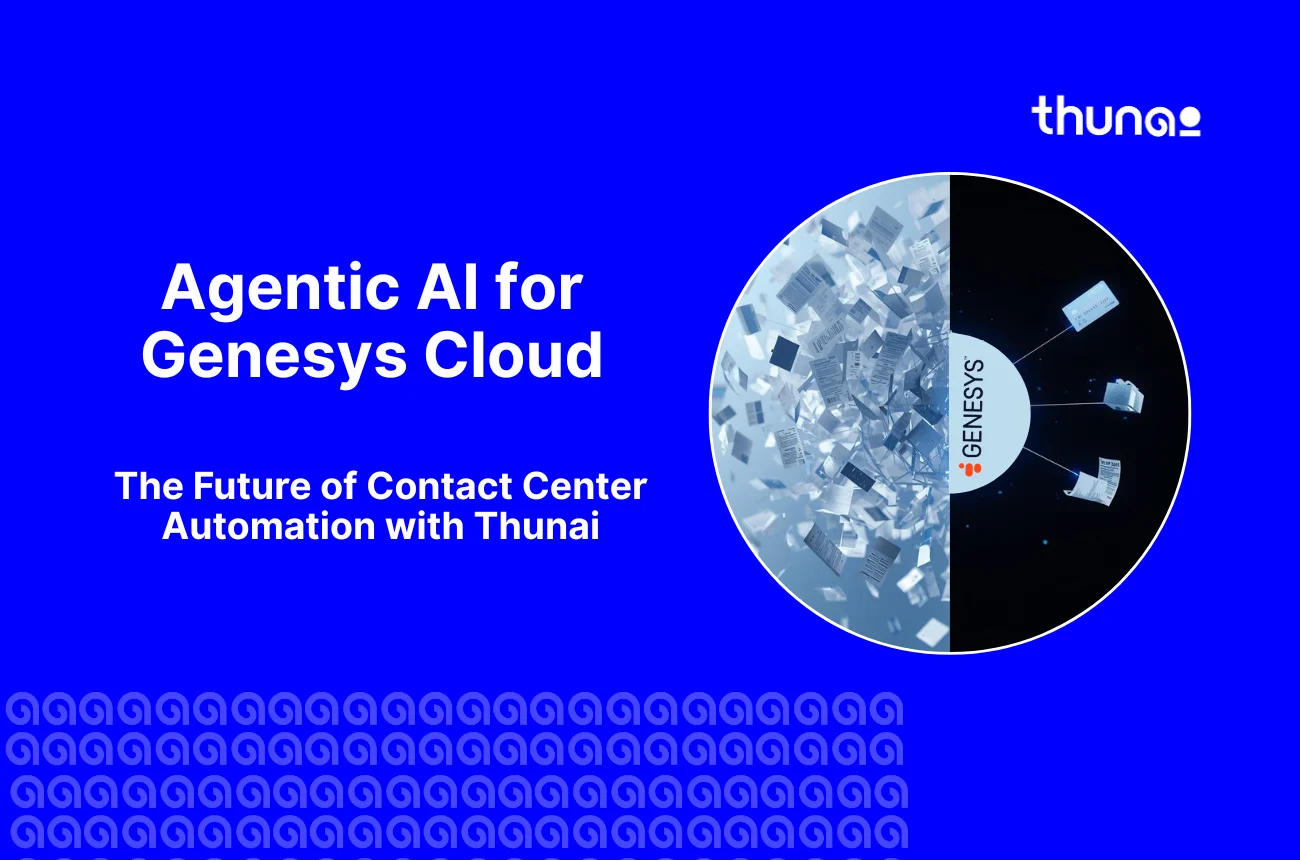


.webp)

